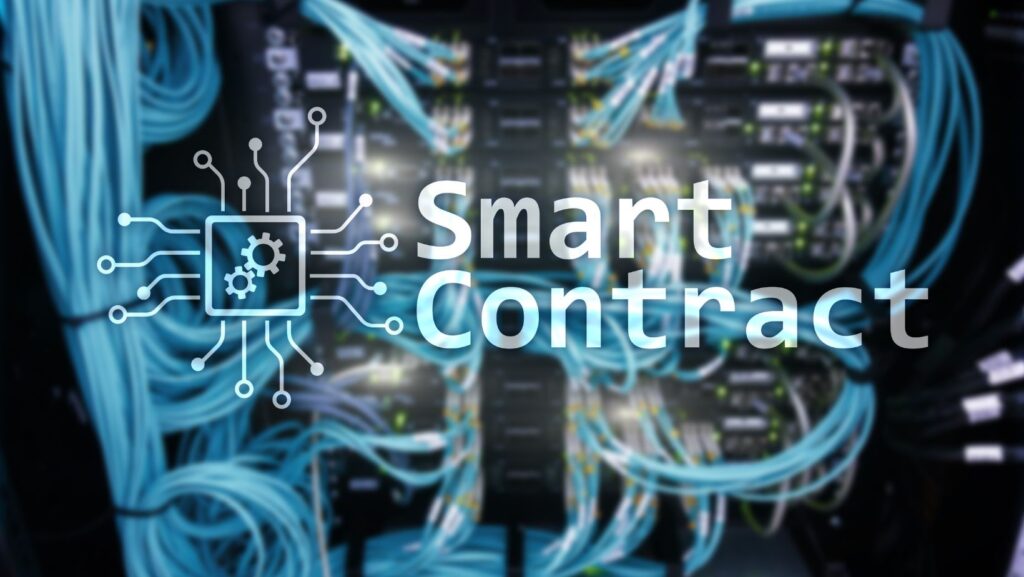
This article offers a meticulously curated overview of the top 10 smart contracts, recognized for their distinctive features and practical applications. Ranging from the extensive blockchain infrastructure of Ethereum to the cost-effective DeFi options available through Binance Smart Chain, popular blockchain platforms present unique advantages designed to satisfy the diverse demands of users in the swiftly evolving domain of leading smart contract technologies.
At the heart of these sophisticated blockchain ecosystems are smart contracts — automated agreements that execute when predetermined conditions are fulfilled, thereby mitigating risks and eliminating the necessity for intermediary involvement. Initially introduced by Nick Szabo in 1996, this concept reached its zenith with the launch of Ethereum a decade later, fundamentally altering the landscape of contract utilization within blockchain systems.
As we approach 2024, smart contract development platforms face challenges such as the need for clearer regulatory frameworks and the increasing demand for specialized technical expertise. This analysis aims to clarify these challenges, providing insights that empower readers to make informed choices when selecting smart contract ecosystems for their projects in this dynamic environment.
The Transformative Power of Smart Contract Platforms in 2024
Smart contracts are increasingly becoming essential across various sectors, including finance, insurance, and real estate, automating intricate processes from lending protocols to property transactions. Recent innovations have markedly enhanced their efficiency and security. Key advantages include streamlined legal and financial procedures, significant cost reductions through faster processing times, minimized errors, and a considerable shift in traditional business models toward trust-based systems that improve service access for all users. The upcoming year promises even more groundbreaking progress in contract automation and operational effectiveness.
What Are Smart Contracts?
Smart contracts serve as vital pillars of decentralized application platforms, functioning independently within a trustless ecosystem devoid of central authority. Smart contracts act as digital assurances that guarantee compliance with contractual terms by embedding rules directly into the blockchain’s framework, rendering them immutable and enforceable among all participants.
Operational Mechanisms: Smart Contracts within Blockchain Networks
Smart contracts operate in blockchain environments through complex programming logic that defines conditions for transaction execution via algorithms. These transactions are securely recorded on the blockchain, requiring precise descriptions of contractual terms. However, due to their isolated nature, smart contracts depend on oracles — external data providers that can include hardware devices, network nodes, or specialized layers with dedicated consensus protocols. While maintaining the integrity of the blockchain, these oracles facilitate the translation of off-chain data into a format usable within the system; platforms like Aeternity even integrate them directly into their ledgers.
Varied Classification of Smart Contracts
Smart contract functionality can be categorized based on various dimensions: execution environments (centralized vs decentralized), privacy levels (fully transparent, partially private, or confidential), and initiation methods (limited scope vs predefined).
Furthermore, they can be classified by their degree of automation concerning physical documentation — fully automated with no paper trails, partially automated with a hybrid approach, or mainly digital for storage purposes. Initially confined to basic functions on Bitcoin’s blockchain, the desire for smart contract efficiency fueled the emergence of platforms like Ethereum. This critical distinction lies not only in the use of Solidity as its programming language but also in its innovative transaction model that supports token creation and ERC-20 standard interoperability, setting it apart from Bitcoin’s simpler scripting capabilities.
Sectors Leading the Adoption of Smart Contracts
Smart contract technology has proliferated across various industries, delivering transformative benefits that are reshaping operations:
In cryptocurrency trading, decentralized exchanges (DEXs) utilizing smart contracts have unlocked new possibilities for direct transactions, generating billions in revenue annually.
The financial industry is experiencing a significant transformation, with established entities like Nasdaq adopting blockchain and smart contracts via platforms like Linq, resulting in a 90% reduction in transaction times.
In the insurance sector, startups such as Etherisc have automated claims processing for events like flight delays through smart contract-driven payouts.
Supply chain management is being revolutionized by IBM’s Food Trust platform — a model of enhanced transparency and security enabled by blockchain-based smart contracts.
The Importance of Exploring Smart Contract Capabilities
The appeal of smart contracts lies in their ability to streamline operations by:
● Digitally encoding agreements, thus reducing the need for extensive legal documentation.
● Automating dispute resolution through predefined penalties for non-compliance.
● Envisioning applications that range from car-sharing and real estate leasing to secure voting systems, all supported by blockchain’s unmatched security.
Leading blockchain platforms 2024: A Comparative Analysis
- Ethereum: As the pioneer of smart contracts, Ethereum boasts a vast ecosystem and robust developer resources for decentralized finance (DeFi), non-fungible tokens (NFTs), and DAOs.
Challenges: High transaction fees; Ethereum 2.0 is in development to enhance scalability.
- Binance Smart Chain (BSC): Offers lower fees and faster transactions, making it a popular option for DeFi projects and token launches, though it raises concerns about decentralization.
- TRON: Focuses on high throughput and low transaction costs, excelling in entertainment DApps such as gaming and social media.
- Arbitrum: A Layer 2 solution for Ethereum that significantly accelerates transactions at reduced costs for DeFi applications.
- Cardano: Prioritizes sustainability and interoperability, making it well-suited for identity management and supply chain projects with a strong emphasis on security through its unique staking model.
- Solana: Known for its exceptional transaction speeds and low fees in the DeFi and gaming sectors, although its decentralization is under scrutiny.
- Polygon: (Matic): Enhances Ethereum’s scalability and efficiency, particularly in DeFi and NFT markets through Layer 2 solutions.
- Algorand: Emphasizes speed and efficiency for financial services and supply chain applications, utilizing a robust security framework based on pure proof-of-stake.
- Avalanche: Provides customizable blockchains tailored to DApps, excelling in DeFi and cross-chain interactions at minimal costs.
- Tezos: A unique self-amending blockchain that supports governance models and artistic applications, offering formal verification for security and scalability with minimal transaction fees.
Choosing the Right Platform
The diversity of the best blockchain platforms for smart contracts necessitates that developers navigate a range of priorities:
● For cost efficiency: BSC, Solana, or Polygon are leading choices.
● For security: Ethereum, Cardano, and Algorand are top contenders.
As technology rapidly evolves in 2024, so does the landscape for smart contract deployment across various sectors.
Key Trends Shaping the Future of Smart Contract Ecosystems in 2024 and Beyond
Benefits of smart contracts mirror the evolution of blockchain technology itself, propelled by key trends such as the expansion of the DeFi sector, integration with oracles for external data access, and significant advancements in cross-chain compatibility. This transformation is reshaping opportunities for both developers and businesses.
Interconnected Ecosystems
Cross-platform interactions are being transformed through interoperability solutions that seamlessly connect different blockchains.

These tools create a more cohesive environment, enabling the development of complex, multi-chain applications.
Accessibility of Smart Contract Creation
The emergence of user-friendly low-code and no-code platforms is making smart contract deployment accessible to non-technical users. This shift empowers businesses with intuitive interfaces and pre-configured templates, breaking down traditional barriers to entry.
The Impact of DeFi on Innovation
As decentralized finance (DeFi) continues to surge, particularly in lending and trading, the demand for scalable smart contract solutions intensifies. This growth acts as a catalyst for further technological advancements within the sector.
Dynamics of Market Growth
The global expansion of smart contract use cases is driven by an insatiable demand for secure, automated transactions across various industries. The proliferation of distributed ledger technologies (DLT) plays a crucial role in smart contract adoption, providing robust security frameworks that support digital information management and encourage smart contract adoption.
Ongoing Challenges Ahead
● Regulatory Uncertainty: Inconsistent global regulations create obstacles for investment decisions, undermining both investor confidence and development initiatives.
● Skill Shortage: The specialized technical skills required for creating, managing, and securing smart contracts are scarce, limiting organizations’ ability to find qualified personnel.
● High Adoption Costs: Significant implementation expenses often deter organizations from adopting this technology despite its potential benefits.
● Security Concerns: Despite the advantages of smart contracts, security threats remain a critical barrier to broader acceptance and trust in these systems.
● Limited Real-World Use Cases: The range of practical applications remains somewhat restricted, which could hinder widespread adoption across various sectors.
Selecting Your Smart Contract Platform
The decision between smart contract platforms is determined by specific needs:
1. Ethereum: Ideal for a wide range of DApps, DeFi projects, NFTs, and complex contracts.
2. Binance Smart Chain (BSC): Provides low transaction costs and high speed, making it perfect for frequent trading activities in the DeFi space.
3. TRON: Focuses on entertainment and social media applications with high throughput and minimal latency.
4. Arbitrum: Enhances Ethereum’s scalability without sacrificing security, catering to DApps that require faster transactions.
5. Cardano: Prioritizes sustainability and formal verification for identity management and supply chain projects.
6. Solana: Tailored for high-performance DeFi applications and gaming, supporting thousands of transactions per second at lower costs.
7. Polygon (Matic): Scales Ethereum, offering quick, low-cost transactions suitable for both DeFi and NFTs.
8. Algorand: Concentrates on financial applications and enterprise solutions with rapid transaction finality and minimal fees.
9. Avalanche: Provides customizable DApps and cross-chain capabilities appropriate for a wide array of projects.
10. Tezos: Well-suited for governance-focused projects with self-amending capabilities and a commitment to formal verification.
As the ecosystem continues to evolve, understanding these dynamics is essential for navigating the complex yet exciting world of smart contracts.
By 2024: Specialized Smart Contract Platforms Will Emerge
In the near future (2024), a next-gen smart contract platforms will debut, showcasing distinctive features tailored for various applications.
Ethereum remains a dominant player, supported by a vast network and diverse services; Binance’s Smart Chain is emerging as a cost-effective option for DeFi enthusiasts, while TRON excels in entertainment applications. Arbitrum enhances Ethereum’s scalability, while Cardano and Tezos focus on exceptional security and environmental sustainability.
The growing field of cross-chain interoperability solutions is set to transform blockchain interactions, making them more seamless than ever. Furthermore, the rise of user-friendly low-code platforms is democratizing development for a wider audience.
However, this new era is not without its challenges; regulatory ambiguity and security threats pose significant hurdles that require careful navigation through the continually shifting landscape. Staying informed about smart contract innovations is crucial for thriving amid technological advancements. The choice of platform is influenced by clear objectives, technical specifications, and financial constraints as the smart contract revolution drives innovation across various sectors.


